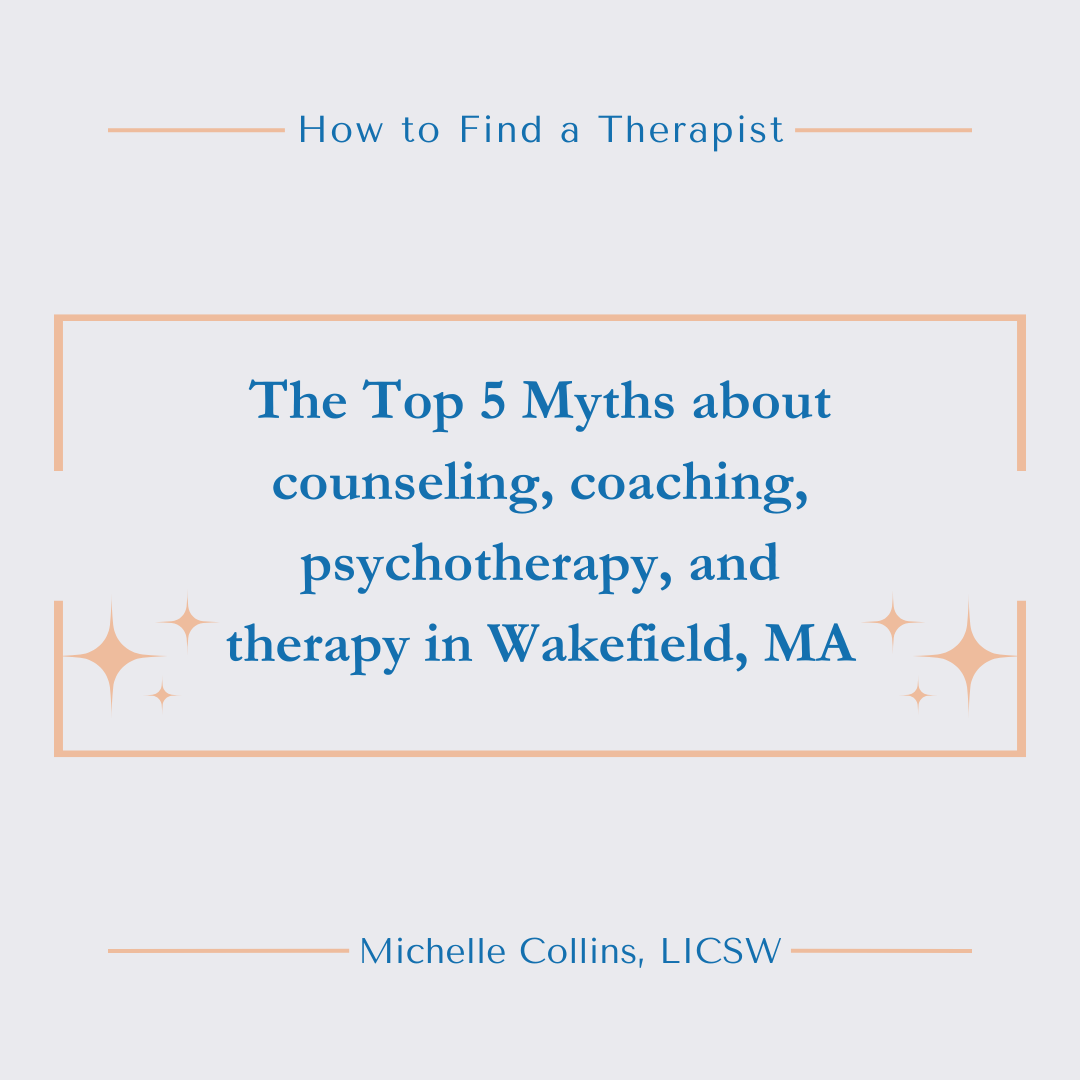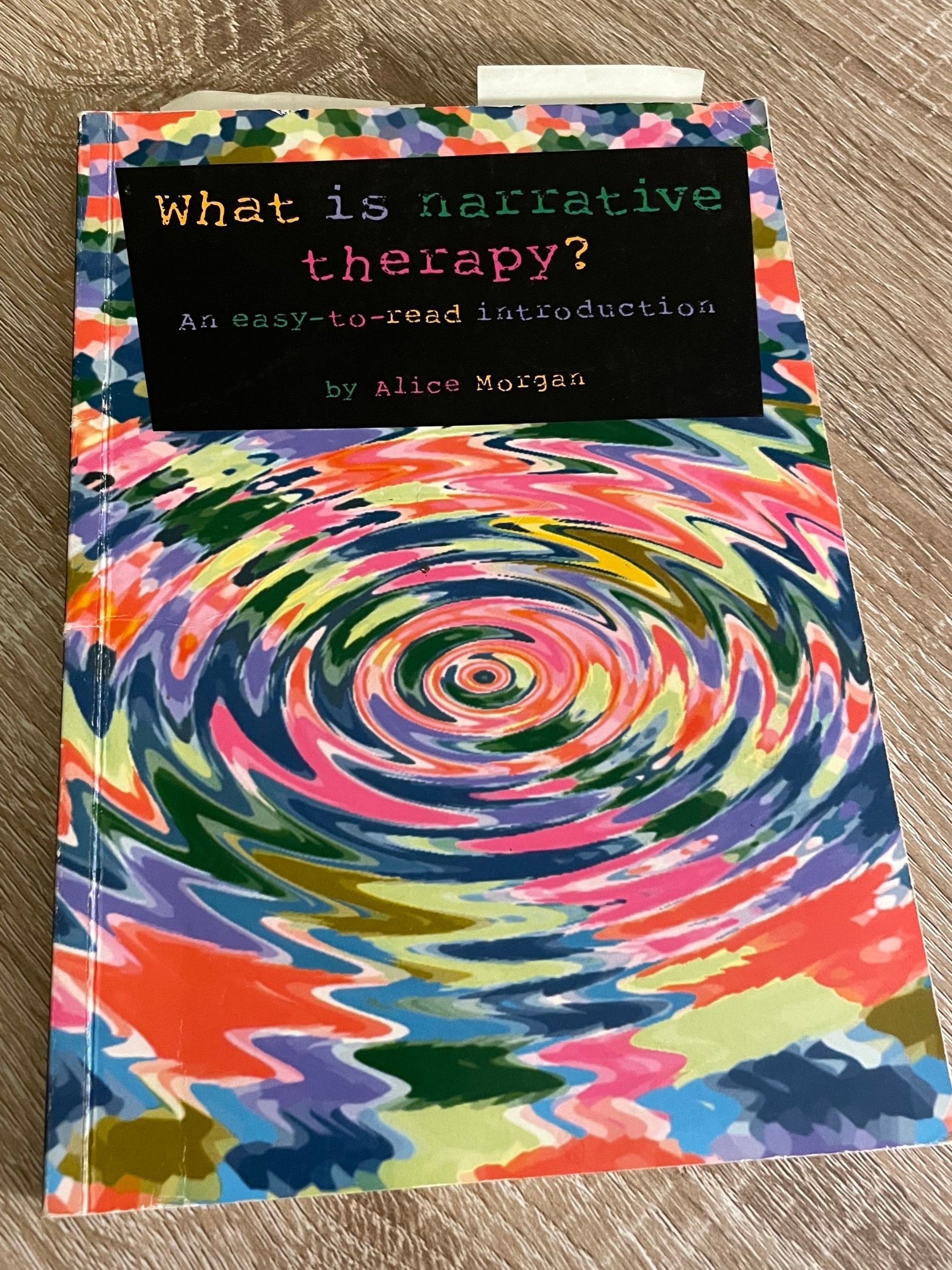The Top 5 Myths about counseling, coaching, psychotherapy, and therapy in Wakefield
Finding the right Wakefield therapist can be easy!
Many people hesitate to start therapy because of common myths and misconceptions. As a therapist in Wakefield, I hope to clear things up and help you feel more in touch with the powerful benefits therapy can have in your life. Whether you are a young adult navigating the transitions of life after high school and potentially after college, whether you just took on the responsibility of taking care of someone else, whether you are juggling what feel like overwhelming demands internally and externally or struggling with insomnia, therapy can help. Can therapy still feel tricky to start? Absolutely, it can feel like “one more thing” when you are already struggling and for many people, meeting someone new is inherently uncomfortable. With a good fit, however, all these challenges will quickly fade into the background and you will be glad you got started.
Myth #1 – Therapy is only for people in crisis
While therapy can certainly be helpful to support people navigating a crisis, it can go well beyond crisis management. In fact, I find that a lot of the best work gets done when someone is not in crisis. Being out of crisis can allow someone more mental energy and emotional distance to really examine what they prefer in their lives and integrate the changes they desire. There is simply more energy available to go into making changes when physical and emotional energy isn’t all tied up in crisis management. The ideal in therapy would be to prevent a crisis.
I generally find that the majority of people I see for therapy would have benefitted from starting therapy long before they did, and they could have spared themselves some anguish if they had done so.
For anyone who has dealt with pain conditions, you have likely heard of the benefits of “staying ahead of” the pain, because pain is easier to manage if it doesn’t get too bad before it gets treated. I recently learned the same is true for seasonal allergies, where managing the allergic response is easier if it never gets big, so treating the allergy early leads to the best results, rather than waiting for a flare and then trying to knock it down for relief.
Therapy can be similar…if something troubling is brewing, it can be really helpful to get it under control before emotions or destructive patterns have boiled over and caused other damage. Is it ever too late? Certainly not. Yet it’s also rarely too early.
Myth #2: Talking about my problems won’t change anything
This one I will give some partial credit! Let me explain. For some people, simply putting words to their experiences and articulating the challenges they are facing can bring tremendous relief. By talking, all the swirling thoughts and feelings need to become somewhat rational in order to be put into words and sentences. That process alone can being a lot of clarity and comfort. So sometimes, simply talking about problems can change emotions very quickly and smoothly.
Therapy involves a lot more than simply talking about problems though, at least with most therapists. Most therapy will involve feedback from a therapist. This can come in a lot of different forms, from encouraging shifts in thinking patterns, to trying relaxation strategies, to recommendations on behaviors to change styles in which to communicate and so much more. As therapists, we work! Our work is often quite demanding as we are constantly working to identify the best strategy and approach to help someone in their unique situation, which may change week to week. We are trained to listen for patterns which might not be apparent to the person in therapy, help the person see them and work together to decide what to do about them. All of these interventions are typically where the real change happens.
Can therapy make your boss nicer to you, a loved one’s health be restored or give you an extra three hours every day? Trust me, I wish it could! It can’t fix everything. Yet it can help you thrive even within these challenging circumstances. The change comes from the therapy process though, not only from talking about problems. In a lot of my therapy, we talk much more about solutions and how to find them, which can be much more impactful.
Myth #3: I should be able to handle things on my own
This belief holds A LOT of people back from therapy which is a shame. Would it be great if we could all handle things on our own? Sort of, we would certainly have more independence that way and there is some value in that. Yet as human beings, we are social creatures, and as such, our brains work best in connection with others. Is it great when natural connections in our lives can fulfill our needs? Certainly. Yet often, we face challenges that exceed our natural supports and their ability to help, or we simply do not have that community available.
The United States Surgeon General even declared an Epidemic of Loneliness in 2023, which can be viewed at the link at the bottom of this post. Is therapy the answer to loneliness? It’s not the whole answer, but it can provide a really critical bridge. The goal is not to have the therapist become a person’s sole community, but rather, to help someone establish a more effective community and to have therapy play a short-term or long-term role within that community. Modern life makes it very challenging to get adequate support from others. More importantly though, the average person is not trained to handle challenges as significant as clinical depression or bipolar disorder or panic attacks.
Modern society brings challenges of loneliness but also brings amazing knowledge and interventions. Did people 200 years ago before therapy was popular simply figure it out on their own? NO! They suffered. They suffered tremendously. You have the option now to have treatment that works. Take advantage of it!
Myth #4: A therapist in Wakefield won’t understand my unique struggles
This can be so incredibly lonely to feel. While therapists certainly have different specialties, whether it be particular ages, life stages, diagnoses or other dynamics (see my earlier blog on this topic), there is absolutely a therapist for everyone. As therapists, we are trained to help others with specific strategies and skills, not only our personal experiences. These strategies and skills help people with any challenge that comes to therapy.
A therapist does not need to have lived your same life experiences to help, though sometimes you may want to look for a therapist with some things in common to you. Finding common ground is often most important to parents or people in substance use recovery, but even that can vary. Interventions are designed to help people regardless of the therapist’s personal experience.
In my years of being a therapist, I have experienced two major things related to this topic. One, is that every person’s experience, story and struggle is SO unique to them and nothing has repeated itself. Honestly, this keeps the work incredibly interesting and no two days are alike, which is something that I love as a therapist. The second, is that amongst all the sessions of therapy I have done over the years, there are a lot of common themes. In fact, the majority of struggles usually relate back to a few core themes in people’s lives. So we work on those core themes, and relief comes in many forms. All of this to say that your experiences are absolutely unique and yet therapy can still help in a highly individualized way, using common strategies and interventions.
Myth #5: Therapy is too New Age, woowoo and is simply kind of weird and “out there”
Does therapy look like a Physics lab? No, I can’t begin to pretend that it is anywhere near that technical or concrete. Yet it is much more solid than some people would believe! There is a lot of high-quality research that has shown the effectiveness of therapy and that for some conditions, therapy is much more effective than medication, which is often considered more “real” of an intervention to some people. While not the best rubric for validity, if therapy was not valid, insurance companies would not pay for it, the government would not pay for it in government-sponsored programs and health plans and the most rigorous academic institutions worldwide would not teach it.
I say all of this as someone with a background in the “hard” sciences, having initially been a Chemistry major in college and ending with a degree in Neuroscience. I spent hours in the lab doing extremely technical, data-driven work, and it was admittedly a lot of fun. For me to shift my career from graph paper (yes a lot was done on paper still in my era), spreadsheets, protocols and experiments into the world of therapy was certainly jarring. The clarity of tasks seemed to evaporate and the sense of conclusiveness became much more hazy. Yet from that ambiguity emerged a very real sense of change for the people I worked with and powerful experiences of witnessing transformations happen, even when they could not be quantified in the ways which I was familiar.
What is Narrative Therapy? - By Alice Morgan
I went into graduate school expecting to be drawn to more formal therapy styles, so you can imagine my surprise when I went to the bookstore to buy my book for an elective that really interested me and it looked like this:
I laughed out loud then promptly felt paralyzed with a fear of “What have I done? Who have I become? What am I doing? This is such hippie nonsense!” Yet I stuck with it and saw that the truth of change through therapy is undeniable. Evidence is shown in different ways and my training allowed me to see that and facilitate the desired change for people who see me for therapy.
So is therapy a little more “out there” than other things in this world? Yep, I’ll give it that! Yet it is still incredibly helpful, effective and worthwhile.
Don’t let any of these myths hold you back! Find a therapist in Wakefield, MA
Are you looking for a compassionate and effective therapist in Wakefield, MA? Whether you are entering therapy for the first time or looking to reconnect with the process, I offer a welcoming, supportive space to explore your challenges and goals. With the flexibility of in-person and online therapy, we can find a space for therapy in your lifestyle and schedule.
Specializing in working with young adults and adults during life transitions as well as with caregivers, I am committed to finding strategies to have you feeling your best. Are you ready to take the next step? Let’s connect over a free, 15-minute phone consultation for therapy in Wakefield.
Like what we talked about today? Check out related articles:
https://www.hhs.gov/sites/default/files/surgeon-general-social-connection-advisory.pdf

